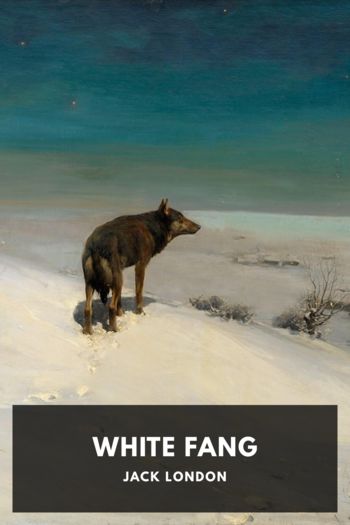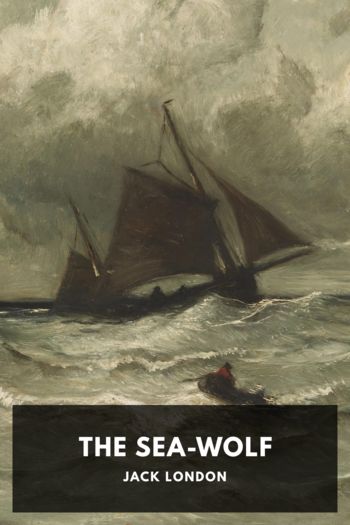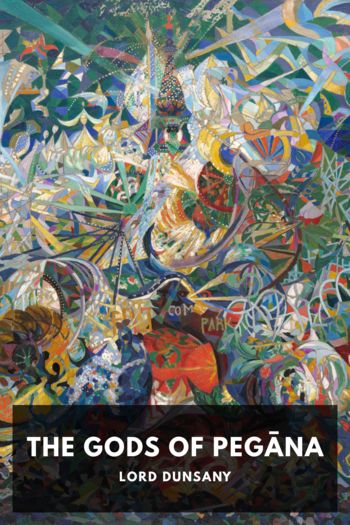White Fang by Jack London (good book recommendations txt) 📕

- Author: Jack London
Book online «White Fang by Jack London (good book recommendations txt) 📕». Author Jack London
Nothing happened. He continued to gaze, and in his interest he forgot to snarl. Also, he forgot to be afraid. For the time, fear had been routed by growth, while growth had assumed the guise of curiosity. He began to notice near objects—an open portion of the stream that flashed in the sun, the blasted pine-tree that stood at the base of the slope, and the slope itself, that ran right up to him and ceased two feet beneath the lip of the cave on which he crouched.
Now the grey cub had lived all his days on a level floor. He had never experienced the hurt of a fall. He did not know what a fall was. So he stepped boldly out upon the air. His hind legs still rested on the cave-lip, so he fell forward head downward. The earth struck him a harsh blow on the nose that made him yelp. Then he began rolling down the slope, over and over. He was in a panic of terror. The unknown had caught him at last. It had gripped savagely hold of him and was about to wreak upon him some terrific hurt. Growth was now routed by fear, and he ki-yi’d like any frightened puppy.
The unknown bore him on he knew not to what frightful hurt, and he yelped and ki-yi’d unceasingly. This was a different proposition from crouching in frozen fear while the unknown lurked just alongside. Now the unknown had caught tight hold of him. Silence would do no good. Besides, it was not fear, but terror, that convulsed him.
But the slope grew more gradual, and its base was grass-covered. Here the cub lost momentum. When at last he came to a stop, he gave one last agonised yell and then a long, whimpering wail. Also, and quite as a matter of course, as though in his life he had already made a thousand toilets, he proceeded to lick away the dry clay that soiled him.
After that he sat up and gazed about him, as might the first man of the earth who landed upon Mars. The cub had broken through the wall of the world, the unknown had let go its hold of him, and here he was without hurt. But the first man on Mars would have experienced less unfamiliarity than did he. Without any antecedent knowledge, without any warning whatever that such existed, he found himself an explorer in a totally new world.
Now that the terrible unknown had let go of him, he forgot that the unknown had any terrors. He was aware only of curiosity in all the things about him. He inspected the grass beneath him, the moss-berry plant just beyond, and the dead trunk of the blasted pine that stood on the edge of an open space among the trees. A squirrel, running around the base of the trunk, came full upon him, and gave him a great fright. He cowered down and snarled. But the squirrel was as badly scared. It ran up the tree, and from a point of safety chattered back savagely.
This helped the cub’s courage, and though the woodpecker he next encountered gave him a start, he proceeded confidently on his way. Such was his confidence, that when a moose-bird impudently hopped up to him, he reached out at it with a playful paw. The result was a sharp peck on the end of his nose that made him cower down and ki-yi. The noise he made was too much for the moose-bird, who sought safety in flight.
But the cub was learning. His misty little mind had already made an unconscious classification. There were live things and things not alive. Also, he must watch out for the live things. The things not alive remained always in one place, but the live things moved about, and there was no telling what they might do. The thing to expect of them was the unexpected, and for this he must be prepared.
He travelled very clumsily. He ran into sticks and things. A twig that he thought a long way off, would the next instant hit him on the nose or rake along his ribs. There were inequalities of surface. Sometimes he overstepped and stubbed his nose. Quite as often he understepped and stubbed his feet. Then there were the pebbles and stones that turned under him when he trod upon them; and from them he came to know that the things not alive were not all in the same state of stable equilibrium as was his cave—also, that small things not alive were more liable than large things to fall down or turn over. But with every mishap he was learning. The longer he walked, the better he walked. He was adjusting himself. He was learning to calculate his own muscular movements, to know his physical limitations, to measure distances between objects, and between objects and himself.
His was the luck of the beginner. Born to be a hunter of meat (though he did not know it), he blundered upon meat just outside his own cave-door on his first foray into the world. It was by sheer blundering that he chanced upon the shrewdly hidden ptarmigan nest. He fell into it. He had essayed to walk along the trunk of a fallen pine. The rotten bark gave way under his feet, and with a despairing yelp he pitched down the rounded crescent, smashed through the leafage and stalks of a small bush, and in the heart of the bush, on the ground, fetched up in the midst of seven ptarmigan chicks.
They made noises, and at first he was frightened at them. Then he perceived that they were very little, and he became bolder. They moved. He placed his paw on one, and its movements were accelerated. This was a source of enjoyment to him. He smelled it. He picked it up in his mouth. It struggled and tickled his tongue. At the same time he was made aware





Comments (0)